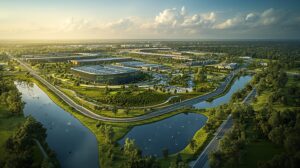
Human-Centered Leadership: A New Paradigm for Organizational Success
An interview with JL Heather, Managing Partner at Centered.Work
Q: Can you tell us about Centered? What services do you offer, and who are your typical clients?
Centered is a coaching and consulting company that focuses on instilling leadership and teams with the skills, behaviors, and practices to unlock the human potential within their organization.
We offer executive and leadership coaching, which is supported by the Leadership Circle Profile.
Our workshop facilitation targets rapid ideation (design sprints), team training and onboarding, culture definition and measurement, vision and strategy, among others.
We consult to help organizations better align with their culture, goals, and pace of their industry.
Our typical clients are small to medium-sized companies that are looking for ways to grow or scale that don’t involve large investments in new people. We typically focus on the digital, product design, or thought-work spaces.
Q: What is human-centered leadership, and how does it differ from what we see in most organizations?
Human-centered leadership holds that any business only succeeds based on the quality of its people. The focus is on using modern organizational and leadership practices to unlock human potential, increase autonomy and problem-solving ability, and boost creativity and innovation.
Many organizations continue to engage in more traditional “command and control” approaches to leading and organizing. This increases turnover and overhead and lowers productivity.
Q: How does Centered help leaders and teams embrace change and transform their organizations?
We partner with organizations to fully understand their current culture and goals so we may tailor our approach to their needs.
Often, we find that working with leaders first to instill transformational mindsets and behaviors creates the foundation for change.
We will collaborate with leadership to help design a future-oriented organization that will thrive rather than resist change.
We demonstrate the culture through collaborative and cross-functional workshops and team coaching.
Q: What advice would you give to individuals trying to navigate changes in the workplace?
There is a lot of truth to the saying, “Be the change you want to see in the world.” It is often most productive to work on yourself first and then become an example.
Also, ensure the language of change is shared. For example, we often work in the agile adoption space, and the term “agile” means many different things to different people. It’s important to spend time establishing a common lexicon to ensure clarity throughout the change process.
Find and elevate change champions at all levels of your organization. There is no such thing as a solely top-down or bottom-up transformation.
Prepare for turnover. Big changes will leave some behind or not match the values of others. For large transformations, we typically expect around 10% turnover due to organizational fit.
Q: What do you think the future of work will look like in the next 5 to 10 years?
Flatter organizations where individuals will operate with higher autonomy. People will be empowered by new technology such as AI and automation to do much more than was previously possible and will need the support and ability to make more impactful decisions and solve more complex problems.
Leaders will need to redefine their roles to become more human-centered and to manage a more highly distributed organization. Far more authority will be delegated than before, and control and measurement systems will have to adapt to support a different style of leadership.









